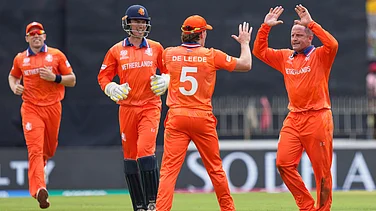In September 2022, when Outlook spoke with Dutee Chand, she was shooting for the dance show Jhalak Dikhla Jaa in Mumbai. (More Sports News)
But life has rarely been a merry song-and-dance affair for the Olympian sprinter. Just a few months after getting applause from Madhuri Dixit and Karan Johar for her moves, Dutee has reportedly tested positive for banned substances.
Allegedly, Dutee’s urine sample of December 5, 2022, taken in Bhubaneswar by the National Anti-Doping Agency (NADA), contained the prohibited category of Selective Androgen Receptor Modulators (SARMs).
This was her ‘A’ sample. She can now offer a ‘B’ sample for testing.
Dutee has denied any wrongdoing.
“I have been competing at the highest level for almost a decade and I have never touched or used any kind of performance enhancing drugs,” she told ‘Indian Express’. “I have given my samples whenever asked. In 2014 I had to fight for my right to run due the hyperandrogenism case and now this has come up. I’ll have to see the letter first to tell you what my next step will be. [So far] I haven’t received any letter from doping agencies or federation yet. I only got to know through media people that a letter is being circulated on social media.”
According to the United States Anti-Doping Agency (USADA), SARMs are a “class of therapeutic compounds that have similar anabolic properties to anabolic steroids, but with reduced androgenic (producing male characteristics) properties”.
Dutee, who will turn 27 on February 3, was born in a poor, nine-member household in Orissa. All they had to eat most days was rice gruel and vegetables.
Running, strongly advocated by her sister Saraswati, offered her a chance at a better life, which she did make for herself. But throughout her career, the twice Asian Games silver medalist faced questions about her gender. In 2014, she was banned from women’s athletics by the Athletics Federation of India (AFI) for having excess testosterone, or hyperandrogenism. (Gender testing only comprises a hormone analysis. Physical verification of gender is not permitted).
Dutee then appealed to the CAS (Court of Arbitration for Sports), which then tweaked rules, allowing Dutee to compete.
The crux of Dutee’s argument was that her high testosterone was natural. “As an athlete, I had done nothing wrong and was being defamed,” she told Outlook. “They said I was a male competing with females. You don’t discriminate between athletes on the basis of their height or figure, why do you discriminate on the basis of testosterone? It is a natural condition.”
Back in 2014, when Dutee was barred from competition, well-wishers advised her to accept the decision and move forward.
“Sabne pehle kaha ki, ‘Dutee, aisa rule hai. Jo hua woh hua, tum ghar aa jao. (Everyone told me, ‘Look Dutee, these are the rules. Let bygones be and come home’) But I wanted to do something about it, as I had not done anything wrong,” she said.
Later on, it was Dutee’s personal life, which came under scrutiny. She was in a same-sex relationship, which made her an outcast in some of her circles. Saraswati, once her mentor, fell out with her too.
“Duniya sangharsh hai (the world is a challenging place),” Dutee said when asked what she would advice people beset by problems. “If you don’t fight, people will walk all over you. Himmat nahi harna (don’t lose courage).”
Even more important than courage is truth. It often gets lost in the many-layered world of Indian sports, especially non-cricket Indian sports. Dutee and the relevant organizations owe it to themselves and stakeholders the facts, sans spin.


























